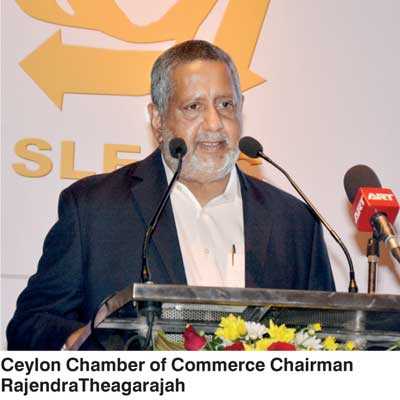Monday Feb 16, 2026
Monday Feb 16, 2026
Monday, 16 July 2018 00:00 - - {{hitsCtrl.values.hits}}
By Charumini de Silva
In a profound evaluation of the export industry of Sri Lanka, the Ceylon Chamber of Commerce (CCC) Chairman Rajendra Theagarajah called on the private sector to drive the export development, insisting to keep Government only to formulate favourable policies for economic growth.
Delivering the keynote address at the 21st Annual General Meeting of Exporters Association of Sri Lanka (EASL) last Friday, he urged the exporters to push Government to remove import protections to open market, relax immigration policies to address talent crunch and encourage private investments in education and healthcare to attract the Diaspora back in the economy, highlighting that the exporters should develop and implement their own innovation-led export strategies.

“Exporters need to do some soul searching. If you are waiting for the Government to come up with a magic answer for innovation, it’s not going to happen. We should leave the Government to formulate policy, but beyond that export development should be private sector driven,” he added.
He underscored that Sri Lanka needs more innovation to be able to move up the global value-added chain to achieve sustainable export growth.
Theagarajah said while the rest of the world is deploying blockchain technology for finance and logistics, Sri Lanka’s regulators are still deliberating on it, leaving Sri Lanka behind as technologies advance elsewhere in the world.
“If you are waiting for the Government to come up with a magic answer for innovation, it’s not going to happen,” he pointed out.
He also pointed out that innovation is a key area everyone will be watching in the National Export Strategy (NES), which will be launched from this week (19 July).
“Ask yourselves, are you engaging with start-ups and investing in the future? Do you plough back at least half a percentage to invest in innovation? Are you investing and collaborating with universities to develop new products and solutions? Or are you waiting for someone else like the government to do that for you?” Theagarajah asked.
He noted that Sri Lanka was scrapping the bottom of the barrel when it comes to the professional skills that require to foster innovation and propel economic growth.
“There is a critical co-relation between a nation which has successfully gone up the global value chain with innovation and relaxed immigration policy. These are intrinsically connected and cannot be disassociated. This is not just hearsay, but there are many examples out there,” he said.
Theagarajah highlighted Malta as a successful island-nation that has propelled economic growth with strong export-led policies.
“Malta literally has no other natural resources apart from a port, but exports account for 60% of its GDP. This is possible because Malta has an immigration policy which encourages people to come in, add value to the country and then leave. We always talk about establishing ourselves as the gateway to South Asia but are we doing enough to encourage people to come here and add value? We need to do some soul searching,” he urged.
Noting that Sri Lanka experienced a brain-drain during the three-decade long conflict from all communities, he said nearly 10 years of peace hasn’t attracted the Diaspora and their investments, in droves either.
“Two of the biggest challenges for returnees to Sri Lanka are the cost of quality education and healthcare. In the absence of those ingredients you are not going to get a reverse brain drain into the country. So what needs to be done to bridge the euphoria and expectation with reality? We’ve got to open up the market for at least a short time so Sri Lanka can at least fill its own demand,” Theagarajah said.
“We need the courage to open markets, at least so that we can prop-up our own talent,” he said.
He insisted that as an island nation, it is important to realise that one cannot do business and grow without international trade. “It’s not just about growing exports. To improve connectivity and competitiveness of our exports we need imports. There is a need for the elimination of para tariffs and barriers to trade in this country,” he said.
He urged the EASL to put pressure on the Government to remove para-tariffs and barriers to trade in order to uplift our export competitiveness.
With many people express reservations and few fear mongers about free trade agreements (FTAs) with India, Singapore and China, he stressed that exporters should be looking for opportunities instead.
“A recent survey by ACCA Sri Lanka showed that less than one-in-five business executives knew about China’s Belt and Road Initiative (BRI), a $4 trillion trade initiative that embraces Sri Lanka as well. Are our exporters geared to seize the opportunities or are we fighting shy saying China is going to swallow us all,” he asked.
Theagarajah also emphasised the need to stop asking for protection from a depreciating currency.
“When we talk about trade competitiveness it is time we stepped away from protection of a depreciating currency, there comes the need for the elimination of para tariffs and tariff structures in this country. Of course, there is an ongoing challenge on one side, while we need to bring our tariffs and para-tariffs online with the region on the other hand we are challenged by a fiscal deficit,” he added.
Pix by Upul Abayasekara
